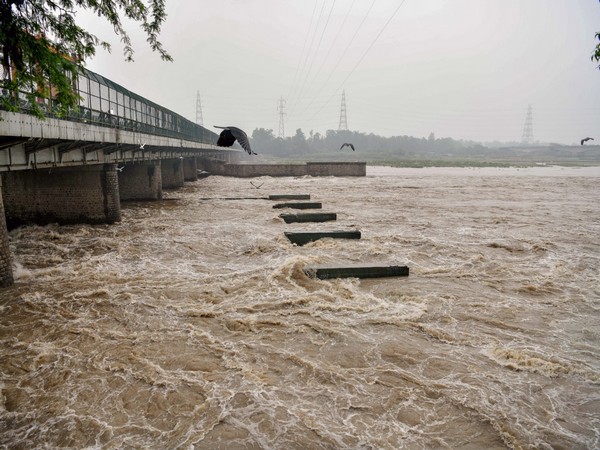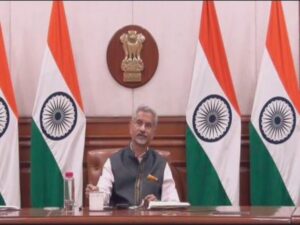
New Delhi [India], July 11 (ANI): Water in Yamuna crossed the danger mark and an orange alert was issued for Delhi as the areas in the city continued to face water-logging due to incessant rains on Saturday and Sunday and a fresh spell of rainfall on Monday. The excess rainfall has impacted all sections, including the poor, the daily wagers and those commuting to reach their destinations. While families around the Yamuna living in hutments will have to shift in case water level rises further, rainwater also entered the homes of some civil servants.
The plight of locals across the societal divide has only served to reinforce the fact that the floods, this year, have hit the poor as well as the powerful. As the rainwater inundated roads and led to long queues of vehicles stuck in the downpour, residents, including people living in the diplomatic enclave in Chanakyapuri, vented out their migivings over Delhi’s inadequate drainage system.
The diplomatic enclave housing foreign missions, in Chanakyapuri, as well as other areas housing VIPs were inundated. Owing to the heavy rainfall and waterlogging, the New Delhi Municipal Council (NDMC) also advised senior bureaucrats residing on ground floors to relocate to safer places as a precautionary measure.
There were reports of house collapses and waterlogging in several residential colonies. Waterlogging woes were also observed in diplomatic enclaves such as Chanakyapuri, Kaka Nagar, Bharti Nagar, and other prominent roads and colonies in the jurisdiction of the NDMC.
The eastern region of Delhi, originally part of the Yamuna floodplains, is a low-lying one prone to flooding. Two days of incessant rainfall, the most that Delhi has seen in 20 years, has only exacerbated the plight of locals while exposing the faulty drainage system of the national capital. Delhi received 153mm of rainfall over 24 hours, the highest quantum of precipitation recorded in a single day in July in 40 years.
As the city received heavy showers, dwarfing a 41-year record on Sunday, nearly everyone –from street dwellers to residents of the diplomatic enclave, were affected by the waterlogging. According to the Safdarjung weather station, Delhi, on Sunday, witnessed its highest rainfall in a single day in July since 1982, recording 153 mm rainfall in the 24-hour period ending at 8:30 am. The city has three major drainage basins — Najafgarh, Barapullah, and Trans-Yamuna.
Two days of continuous downpour wreaked havoc on the national capital as arterial roads, parks, underpasses, markets, and even schools and hospitals were inundated. Women and children were seen wading through waist-deep water.
Meanwhile, the India Meteorological Department issued a ‘yellow alert’ for the national capital on Monday, indicating cautionary weather conditions. However, the Yamuna in Delhi, which had been flowing above the warning level, crossed the danger mark of 205.33 meters at 5 pm on Monday, according to the latest data from the Flood Control Department.
The IMD had earlier issued a ‘Red alert’ till Thursday, cautioning people against stepping outdoors.
The downpour forced school closures in a number of areas of the national capital as well as neighbouring Uttar Pradesh. Delhi Chief Minister Arvind Kejriwal said the decision on closing schools was made “in view of the torrential rains lashing Delhi since last 2 days and warnings from the Meteorological Department.”
A senior Indian Administrative Service (IAS) officer living in the Bharti Nagar area had to vacate her house with her children, as rainwater entered the premises. The NDMC advised residents on the ground floors to find alternative accommodations until the water subsides. Amid the record showers in the city, Delhi Fire Service (DFS) officials said two people were injured after a house collapsed in the Zakhira area account of heavy rainfall.
“The Delhi Fire Service (DFS) received information about a house collapse at 9.34 am in the Zakhira locality on July 9,” said an official. Power supply was also disconnected in all areas affected by waterloggng to reduce the risk of electrocution. Even as showers continued to drench the city, traffic snarls and congestion were also reported in several areas.
The traffic police officials said heavy waterlogging was reported at Lajpat Nagar, Neb Sarai, Rajdhani Park, Okhla underpass, the road near Delhi Golf Club, near Tikri Kalan metro station and near Apollo Jasola metro station, Bahadurgarh, Nangloi, and Najafgarh, among others, throwing traffic out of gear and resulting in snarls.
Mangolpuri Industrial Area Phase – I and Pocket B Industrial area, Inder Enclave, Block -D Samalka, Phirni Road, Kanjhawala village, Ladpur Majra road, New Friends Colony, Seelampur, Shahdara, Lohe Wali Gali, Hauz Qazi, Chandni Chowk, Jangpura, Bijwasan were among other areas affected by waterlogging, according to data shared by the Central Control Room of the MCD from 8 am to 4 pm.
CM Kejriwal, meanwhile, cancelled the Sunday leave of all government officials, directing them to hit the ground, instead, and conduct inspections to assess the situation.
He informed further that fellow Cabinet members and Mayor Shelly Oberoi will inspect the “problem areas” of the city. Meanwhile, on Monday, the flooding woes of the people were exacerbated after the Yamuna crossed the danger mark of 205.33 metres at 5 pm. According to the flood bulletin, the water level at the Old Railway Bridge rose to 205.4 metres at 5 pm and 205.64 metres at 7 pm on Monday, prompting the government to initiate the process of evacuating people living on the floodplains.
According to Delhi Minister Atishi, over 50 motorboats were deployed in Yamuna for the rescue work. “Efforts are underway to evacuate 40,000 people from Yamuna Khadar,” she said. The water level in Yamuna has been rising continuously as Haryana released more water into the river from the Hathnikund barrage, amid heavy rainfall.
The Yamuna crossed the warning mark of 204.5 metres at 1 pm. According to the Flood Control Department, around 2,15,677 cusecs water was discharged through the Hathnikund barrage at 3 pm on Monday.
Earlier in the day, Delhi Minister Saurabh Bharadwaj said the government was alert to the situation and was fully prepared to deal with it. “Delhi government is fully on alert. As the water level in the Yamuna crosses 206 metres, we will start shifting people living on the banks. The process of taking them to the relief camp will be started. Earlier, we had anticipated the water level in the Yamuna to cross 205 metres on June 11, but it did so today itself as more water was released from Haryana,” the minister told ANI.
Earlier, on Monday, Chief Minister Arvind Kejriwal said there is no threat of flooding to the national capital due to the rise in the water level of the Yamuna on account of the heavy rainfall. He also urged all political parties to refrain from indulging in a blame game stating that it was not the time to “point fingers” at each other.
Amid persistent rains on Monday, the tunnel connecting Pragati Maidan to the transit corridor was temporarily closed due to intense waterlogging. According to traffic police, the downpour in the area has resulted in the flooding of the Pragati Maidan tunnel, rendering it inaccessible for public use. “To mitigate the waterlogging situation, an extensive pumping operation is currently underway,” a traffic officer said.
Officials added that there was waterlogging since the morning hours, following heavy rainfall, resulting in traffic snarls across the city. Calls reporting traffic congestion, failure of traffic signals, waterlogging as well as uprooting of trees and potholes on roads were received by the Traffic Control Room of Delhi Police. (ANI)

















